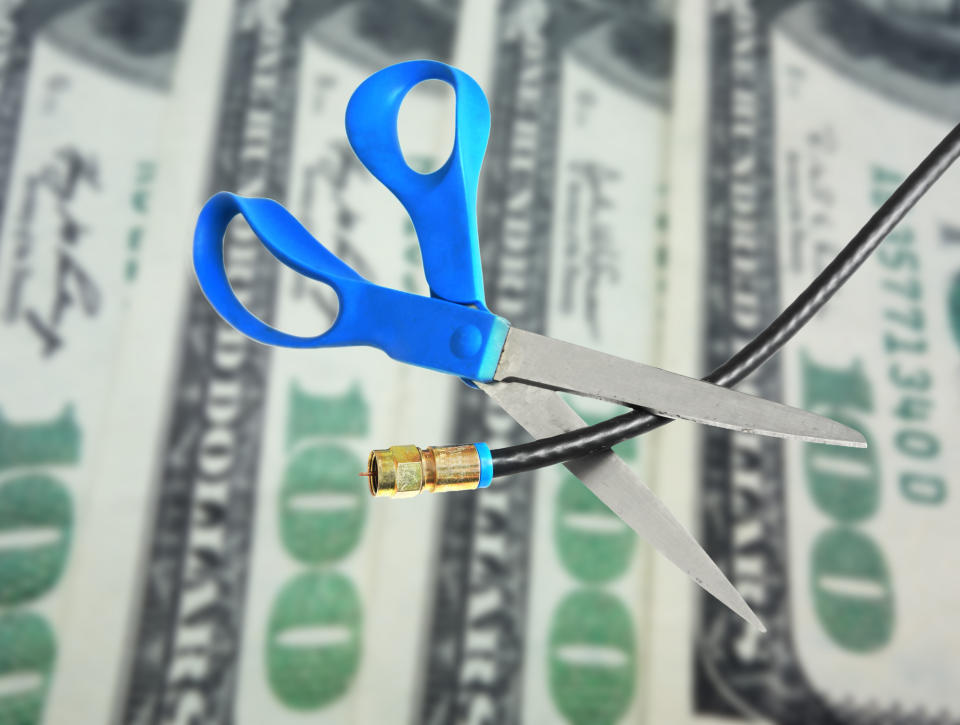When Apple Runs the Hub, Who Pays?
Apple (NASDAQ: AAPL) likes to sell content -- other companies' content. Through its iOS platform, tvOS platform, TV app, and other mediums, Apple invites its many loyal users to sign up for third-party services or consume third-party content. And when consumers choose to sign up for subscriptions through Apple's portals, Apple takes a cut of the cash. People call this the "Apple tax."
The rumor mill recently cranked up with buzz that Apple was seeking as much as 50% of gross subscription fees from its forthcoming subscription news service. The other half would go into a pool and the publishers producing the content would divide that based on how much time users spend with their articles, according to a report in The Wall Street Journal, which cited "people familiar with the situation."
But companies aren't necessarily pleased with giving Apple a big cut of a subscription fee. We can see that already in dissatisfaction with the system that has Apple taking a cut when people sign up for a subscription via Apple.
Spotify (NYSE: SPOT) has reportedly contemplated ditching its arrangement with Apple, while Netflix (NASDAQ: NFLX) has actually followed through. Apple's role as a hub means different things for different types of companies, and the crucial factor in the dynamic is the size and power of the streaming service in question.

Image source: Getty Images.
Hubs have more to offer smaller services
Subscription and streaming hubs like the ones Apple maintains have the most to offer to smaller streaming services. A service like Netflix can afford to ditch the "Apple tax" and demand that consumers pay directly, but smaller services suffer when signups are not as convenient as possible. Take AMC Networks' (NASDAQ: AMCX) Shudder, for instance. When it briefly went missing from Amazon's (NASDAQ: AMZN) Amazon Channels service, investors were quick to question AMC's brass.
Or consider niche streaming service CuriosityStream, which offers nothing but documentary content. Hardly a household name, CuriosityStream reaches many of its subscribers through intermediaries like Amazon Channels or Dish's (NASDAQ: DISH) live TV streaming service, Sling TV, which offers CuriosityStream as an add-on to a live TV streaming package. While Netflix can afford to give up Apple-powered signups within its own app, CuriosityStream is actually putting its whole service on other services' apps.
Small companies aren't necessarily pleased to be giving some of their subscription earnings to Apple or Amazon, but they get a lot more in return than established companies do, because they need the exposure. There's reason to think that the subscription hub is the future of streaming, and that such a future would foster diversity in small, niche services.
On the other hand, there's also reason to believe that the future could be pretty grim for the services that need hubs the most -- and a lot easier on those who need them the least.
Big discounts for the big dogs?
Companies like Netflix, with huge, loyal fan bases, are big enough to buck the Apple tax. The hubs need big services like Netflix far more than Netflix needs any hubs.
Netflix is not expected to be a part of Apple's new subscription service, which will include original content from Apple (free to users of Apple platforms) as well as premium content available via subscription. But Apple is reportedly still trying to woo some other streaming giants and content producers, including HBO. But to get the deal done, it seems likely that Apple will have to adjust alleged demands for 30% of subscription revenue. That would be double the 15% cut that Apple takes for signups through the iOS platform, and it's likely too much for HBO's taste, especially as parent company AT&T (NYSE: T) readies a streaming service of its own.
In other words, HBO has leverage. It doesn't need Apple's new service, but Apple's new service sure could use HBO and thus it is likely to offer a deal. And that won't benefit the smaller players at all.
If small-time players like CuriosityStream are forced to hand over much larger percentages of their earnings than giants like HBO are, then hubs might kill such services as easily as save them.
More From The Motley Fool
John Mackey, CEO of Whole Foods Market, an Amazon subsidiary, is a member of The Motley Fool's board of directors. Stephen Lovely owns shares of Amazon, Apple, AT&T, and Netflix. The Motley Fool owns shares of and recommends Amazon, Apple, and Netflix. The Motley Fool has the following options: long January 2020 $150 calls on Apple and short January 2020 $155 calls on Apple. The Motley Fool recommends AMC Networks. The Motley Fool has a disclosure policy.
